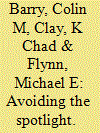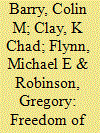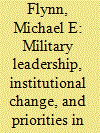|
|
|
Sort Order |
|
|
|
Items / Page
|
|
|
|
|
|
|
| Srl | Item |
| 1 |
ID:
123623


|
|
|
|
|
| Publication |
2013.
|
| Summary/Abstract |
Nonstate actors, such as international non-governmental organizations (INGOs) and multinational corporations (MNCs), have attained an increasingly prominent role in modern world affairs. While previous research has focused on these actors' respective interactions with states, little attention has been paid to their interactions with each other. In this paper, we examine the extent to which the decisions of private actors seeking to invest abroad are affected by the reputational costs of doing business in countries publicly targeted by human rights activists. We find that ''naming and shaming'' by human rights INGOs tends to reduce the amount of foreign direct investment received by developing states, providing evidence that INGO activities affect the behavior of MNCs. An additional implication of our findings is that shaming by INGOs can impose real costs on targeted states in the form of lost investment.
|
|
|
|
|
|
|
|
|
|
|
|
|
|
|
|
| 2 |
ID:
168561


|
|
|
|
|
| Summary/Abstract |
Since the 1950s, US military personnel have taken on an increasingly diverse set of responsibilities, including less traditional roles delivering disaster aid and engaging in public diplomacy. Focusing on a particular subset of deployments, humanitarian and civic-assistance deployments to Latin America, we examine the effect that a US military presence can have on public opinion in the host country. We focus on the microfoundations of popular support and use survey data and newly collected subnational data on deployments to examine the effect of these deployments on mass attitudes toward the US military and government in Peru. We find that these deployments do improve perceptions of the US military and government, and correlate with assessments of US influence that are more positive. Our findings bolster the conclusions of previous research that shows how aid can both improve public attitudes toward the donor country and address the foreign aid attribution problem.
|
|
|
|
|
|
|
|
|
|
|
|
|
|
|
|
| 3 |
ID:
138301


|
|
|
|
|
| Summary/Abstract |
What determines the location of those human rights international non-governmental organization (INGO) resources found outside of the highly developed Western democracies? We draw a distinction between the bottom-up mobilization processes driving the location of human rights organization (HRO) members from the top-down strategic concerns driving where HRO leaders place permanent offices. In particular, we find that, while political opportunity structures generally increase the likelihood that a state has HRO members, it has a curvilinear influence on the number of HRO secretariats, which typically locate in areas seen as having a higher need for organizational resources. Further, while there is no clear connection between human rights abuses and HRO memberships in a state, HROs' strategic concerns lead them to place offices with reference to both local and neighborhood “need”—in other words, levels of repression.
|
|
|
|
|
|
|
|
|
|
|
|
|
|
|
|
| 4 |
ID:
134151


|
|
|
|
|
| Publication |
2014.
|
| Summary/Abstract |
Allowing or restricting foreign movement is a crucial policy choice for leaders. We argue that freedom of foreign movement reduces the level of civil unrest under non-democratic regimes, but only in some circumstances. Our argument relies on the trade-offs inherent in exit and voice as distinct strategies for dealing with a corrupt and oppressive state. By permitting exit and thereby lowering its relative costs, authoritarians can make protest and other modes of expressing dissatisfaction less attractive for potential troublemakers. Liberalizing foreign movement can thus function as a safety valve for releasing domestic pressure. But the degree to which allowing emigration is an effective regime strategy is shaped by the economic opportunities offered by countries receiving immigrants. We find that freedom of foreign movement and the existence of economic opportunities abroad reduce civil unrest in non-democratic states. However, at high levels of unemployment in the developed world, greater freedom of foreign movement actually increases protest.
|
|
|
|
|
|
|
|
|
|
|
|
|
|
|
|
| 5 |
ID:
148159


|
|
|
|
|
| Summary/Abstract |
We analyze how the deployment of US troops affects host-state defense spending. We test this relationship, from 1951 to 2003, by examining how the deployment of US military forces impacts defense spending in different types of states, including US allies, NATO members, non-allies of the United States, and all states. We also utilize spatial measures of US troop deployments to analyze how regional and neighborhood concentrations of forces shape host-state policies. Using both traditional panel methodology, and incorporating a simultaneous equation model for the deployment of troops, we find that non-allied states tend to decrease their defense burden when the United States places troops within their borders. However, NATO allies consistently increase their defense burden in response to the presence of US troops within their borders. Additionally, most states tend to increase spending when the United States places troops near their borders.
|
|
|
|
|
|
|
|
|
|
|
|
|
|
|
|
| 6 |
ID:
131058


|
|
|
|
|
| Publication |
2014.
|
| Summary/Abstract |
How does political competition among domestic actors influence foreign policy choice? Studies examining these questions often focus on the role of economic or partisan interests, and how they influence the preferences of decision makers who are subject to electoral institutions and pressures of their constituents. Less attention has been paid to how the preferences of other influential but unelected actors influence state behavior. I examine the influence of one such group by looking at how American military leaders shape decisions on military spending and force structure, while also examining how these decisions have been affected by changes to the institutions governing civil-military relations. Results indicate that military leaders occupying key positions can influence defense spending priorities in favor of their respective branches. Results also suggest the influence of military leaders has changed and is conditional upon the institutions governing the relationships between civilian decision makers and military leaders
|
|
|
|
|
|
|
|
|
|
|
|
|
|
|
|
|
|
|
|
|